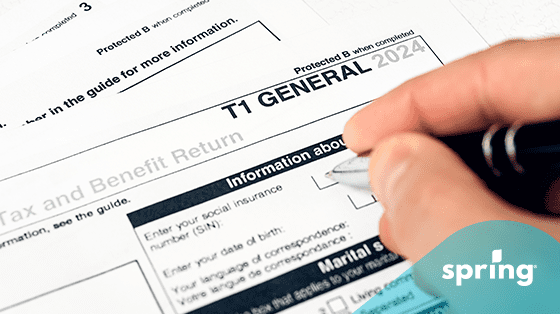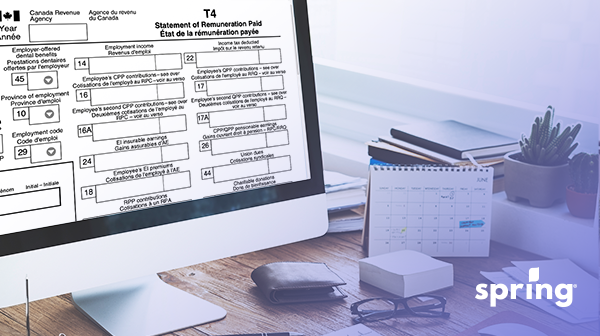What is Old Age Security?
Old Age Security (OAS) is Canada’s largest pension program that gives eligible residents and citizens a taxable monthly payment once they reach the age of 65. The government’s general tax revenues fund it so you don’t have to pay into it directly. Unlike the Canada Pension Plan (CPP) and employee pension plans, OAS benefits are not connected to your employment history, so you can still receive them even if you’re still working or have never been employed.

Who is Eligible for OAS?
You need to be aged 65 or older to qualify for the OAS pension. There are also other eligibility requirements depending on where you live.
If you’re living in Canada, you must:
- be a Canadian citizen or legal resident when your OAS application is approved
- have resided in Canada for at least ten years since the age of 18
If you’re living outside of Canada, you must have:
- been a Canadian citizen or legal resident when you left Canada
- resided in Canada for at least 20 years since the age of 18
If you don’t fit into either of these scenarios, it’s still possible to obtain an OAS pension, a pension from another country, or pensions from both Canada and the other country, as long as you:
- resided in a country where Canada has a social security agreement, or
- contributed to a social security system in a country where Canada has a social security agreement
Canadians working outside the country for Canadian employers (i.e. military and banks) may have their time abroad counted as residence in Canada. To qualify for this, you must have turned the age of 65 while still employed or returned to Canada within six months of ending employment.
How Long Do You Have to live in Canada to get an Old Age Pension
In most cases, in order to qualify for OAS, you have to have lived in Canada for 40 years after the age of 18. However, if you have lived in Canada for at least 10 years after the age of 18, then you could also still qualify. However, if you haven’t lived in Canada that long, if you’ve lived in a country that has a social security agreement with Canada, you could still qualify.
How Much Can I Get From OAS in 2026?
From January to March 2026, the maximum OAS pension rate you can receive from OAS is $816.54 if you are 75+ and $742.31 if you are between the ages of 64 and 74. This amount is adjusted quarterly in January, April, July, and October based on changes to the Consumer Price Index.
The Guaranteed Income Supplement and Old Age Security
In Canada, the main pensions are the Old Age Security Pension and the Canada Pension Plan. However, based on how much income you make per year, you could also qualify for Guaranteed Income Supplement (GIS) payments along with your Old Age Security Pension Payments.
These payments are intended to help those who receive OAS pension payments pay their living expenses. However, qualifying for the GIS is based on your combined income and will determine if you receive OAS payments as well as GIS payments or if you receive the maximum monthly amount. Your personal savings usually aren’t used to determine whether or not you qualify.
How is the OAS Pension Calculated?
OAS pension amounts are determined by how long you’ve lived in Canada after turning 18. You’re entitled to a full pension if you’ve lived in Canada for at least 40 years. If you haven’t, you can still get a partial OAS pension, which is 1/40th of the full OAS pension for every year you’ve resided in Canada since age 18. Let’s say you lived in Canada for 30 years since you were 18. In this case, you may qualify for 30/40ths or 75% of the full OAS pension. Once approved, partial pension amounts don’t increase with extra years of residence in Canada.
OAS recipients can also defer their OAS pension for up to five years in exchange for larger monthly payments later. If you choose this option, your monthly pension payment will increase by 0.6% every month you delay receiving OAS, up to a maximum of 36% at age 70. Keep in mind you won’t be eligible for other OAS benefits like the Guaranteed Income Supplement and Allowance during the pension deferral period. If you don’t claim your OAS amounts by the age of 70, then you could risk losing benefits.
How Do I Apply for OAS?
Service Canada will automatically enroll you for OAS if you’re eligible. You can expect a notification letter, also referred to as an automatic enrollment letter, from the government agency the month after you turn 64. If you receive a letter stating you may be eligible for OAS or don’t get a letter at all, you’ll need to apply for OAS online through your My Service Canada Account or by mailing in an application.
When Can I Expect My First OAS Payment?
If you set up direct deposit, OAS payments from your OAS allowance will be sent to your bank account every month on the following OAS Payment Dates:
| Payment Month | Payment Dates |
| January | January 28 |
| February | February 25 |
| March | March 27 |
| April | April 28 |
| May | May 27 |
| June | June 26 |
| July | July 29 |
| August | August 27 |
| September | September 25 |
| October | October 28 |
| November | November 26 |
| December | December 22 |
When it comes to retroactive payments, you can receive retroactive payments for up to 1 year.
Need cash today?
OAS qualifies as income and can help you get approved for a cash advance personal loan. If you need money today, apply with Spring Financial (in just 3 minutes) to get quick funds transferred to your bank account in hours, not days!
- The Guaranteed Income Supplement (GIS) is a non-taxable monthly benefit for low-income seniors living in Canada.
- The Allowance is for low-income individuals between the ages of 60 to 64 who have a spouse or common-law partner that’s a GIS recipient.
- The Allowance for the Survivor is available to low-income individuals aged 60 to 64 who are widowed and residing in Canada.
Payment amounts for these benefits depend on your marital status and previous year’s income. Just like the OAS pension, the maximum monthly payment for the GIS, Allowance, and Allowance for the Survivor are adjusted four times per year based on the Consumer Price Index. Current benefit rates are listed here.

What is the OAS Clawback?
Also known as the OAS recovery tax or the pension recovery tax, the OAS clawback is when you have to repay a portion or all of your OAS pension if your annual income exceeds the threshold amount. Repayments are calculated based on the difference between your net income and the threshold amount for the year.
| Recovery Tax Period | Income Year | Min. Income | Max. Income |
| July 2021 to June 2022 | 2020 | $79,054 | $128,149 |
| July 2022 to June 2023 | 2021 | $79,845 | $129,757 |
| July 2023 to June 2024 | 2022 | $81,761 | $133,141 |
| July 2024 to June 2025 | 2023 | $86,912 | $142,609 |
| July 2026 to June 2026 | 2024 | $90,997 | $148,351 |
| July 2026 to June 2027 | 2025 | $93,454 | $151,668 |
If your income is over the minimum threshold, you’ll need to repay 15% on the additional income up to a maximum of the total amount of OAS collected. Your OAS benefit is reduced to zero if your income exceeds the maximum threshold.
Here’s an example of how the OAS clawback works:
In 2020, you earned $90,000, and the threshold is $79,054. Your repayment would be 15% of the difference between $90,000 and $79,054.
$90,000 – $79,054 = $10,946
$10,946 x 0.15 = $1,641.9
$1,641.9 / 12 months = $136.83 per month
In this scenario, your monthly OAS benefits would be reduced by $136.83 from July 2021 to June 2022.
How do I Minimize OAS Clawback?
You can minimize OAS clawback with the following strategies:
Invest wisely: Not all investment income is taxed the same. For example, interest income from term deposits and Guaranteed Income Certificates (GICs) is 100% taxed, while mutual fund corporations can convert income into capital gains, which are taxed at a better rate than interest income.
Split income with your spouse: Reduce your income by giving your spouse up to 50% of your pension. Income splitting applies to Registered Retirement Income Funds (RRIFs) and annuity income, too.
Take advantage of a TFSA: Investment income generated in a tax-free savings account is non-taxable and therefore doesn’t count towards your net income.
Contribute to an RRSP: Registered Retirement Savings Plan contributions lower your net income. The last day you can contribute to your RRSP is December 31 of the year you turn 71.
Defer OAS and CPP: If you’re planning on working past age 65, it may be a good idea to defer OAS and CPP benefits. Doing so will prevent clawbacks for up to five years and result in larger payments in the future.
Be cautious of capital gains: Capital gains are considered taxable income, so you may want to sell assets that could result in higher capital gains before turning 65.








